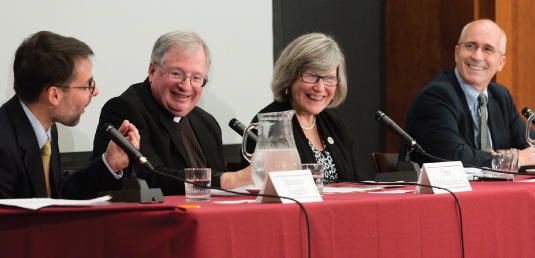
Photo by Leo Sorel
In an interview published Sept. 19 by the national Jesuit magazine America, Pope Francis described his vision of a church that prioritized people over precepts. Again, on Oct. 1, the pope spoke to the media of a narcissistic Vatican whose top-down style of leadership must change.
The pontiff’s words have unleashed positive reactions among Catholics and non-Catholics alike, with some seeing his views as a sign of revival for a struggling church. But what many of Francis’ admirers might not realize is that a similar enthusiasm for a beloved leader swept over Catholics half a century earlier, according to religion experts.
On Sept. 23, a panel at Fordham’s Lincoln Center campus discussed the legacy of the soon-to-be-sainted John XXIII, whose papacy led the church from dark days of global conflict into the start of the Second Vatican Council, launching a new age for the Catholic Church.
Sponsored by the Fordham Center on Religion and Culture, “The Conversion of Saint John XXIII: From Roncalli to the First Pope of the Contemporary World,” featured:
• Moderator David Gibson, national reporter for Religion News Service and author ofThe Coming Catholic Church (HarperOne, 2004);
• Simone Campbell, S.S.S., executive director of NETWORK and co-founder of Nuns on the Bus;
• Drew Christiansen, S.J., visiting scholar at Boston College and former editor-in-chief of America; and
• Massimo Faggioli, Ph.D., professor of theology at the University of St. Thomas, author of Vatican II: The Battle for Meaning (Paulist Press, 2012), and translator of Pope Francis’ America interview.
Born in a small Italian village at the end of the 19th century, Angelo Giuseppe Roncalli followed an atypical route to the papacy. Rather than ascending from bishop, to archbishop, to cardinal, Roncalli spent the majority of his clerical life as a papal diplomat in Eastern Europe. He served for nearly two decades as an apostolic delegate, first in the wilderness of Bulgaria and later in Turkey and Greece.
Ministering in a region with a dearth of Catholics, Roncalli gained exposure to the customs of Eastern Orthodox Christianity and non-Christian religions such as Judaism and Islam.
“It was an eye-opening experience that was extremely unusual for a typical Italian priest of the 1920s and ’30s, and unique in the history of the papacy,” said Faggioli, who studied Roncalli’s journals.
Through his experiences in Bulgaria and Turkey, “he becomes the first globalized pope, the first pope who gets out of his national background, his education, his worldview, and embraces a really Catholic worldview,” Faggioli said.
Roncalli also experienced the acute suffering of the diverse people he lived and worked among. During the onset of the first and second World Wars, he was pivotal in helping Eastern Europeans escape Nazi persecution—an experience that informed his “grand vision of peace” for the rest of his life.
“During World War II, he was involved in attempts to rescue Jews from oppression, issuing baptismal certificates and immigration papers for Hungarian Jews, saving thousands from extermination in Latvia, and helping to stop the deportation of Greek Jews to concentration camps,” Father Christiansen said.
Panelists said it was his profound understanding of human suffering, together with an ethos of peace and kindness, that defined his papacy.
“He was a contemplative in action,” said Sister Campbell. “The warmth of his welcome was key—if your heart has been broken, if you know what it is to suffer, if you’ve walked with people on the margins… you have a heart for all of the people.”
It is no wonder, she noted, that parallels arise between John XXIII and Pope Francis.
“The struggle with the church of late is that we’ve not had enough broken-hearted leaders. But that broken heart is a telltale sign of John XXIII and now Francis,” she said. “They’re not of the colonizer [mindset], but of the colonized… not coming at [the papacy]as a monarch, but as a father, one who embraces, welcomes.”
Pope Francis’ receptiveness to interviews also evokes Pope John XXIII, panelists said. As “the first pope of the contemporary world,” John XXIII was a pioneer in using the media to promulgate his message.
“It was just the beginning of television and global communications. The fact that John XXIII used these to get a message out is a key part, and it met a hungry world,” Sister Campbell said. “As long as the message is nourishing, it’s good work.”
Father McShane on Pope Francis’ Comments
Joseph M. McShane, S.J., president of Fordham, joined a roundtable discussion on Charlie Rose’s PBS show, “The Week” on Sept. 20. To view his appearance visit www.fordham.edu/JesuitsOnPope
